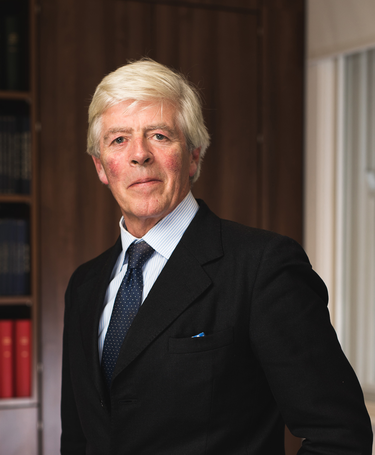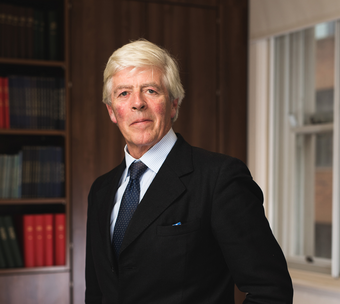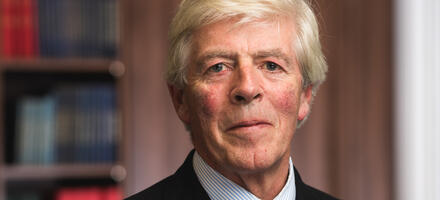
Meet our new president: Lord Lindsay
Progress indicator
CQI’s new president, Lord Jamie Lindsay, talks to Alicia Dimas about the importance of a quality culture in a time of political and economic uncertainty, and the ambiguity of the post-Brexit landscape
The Chartered Quality Institute (CQI) Board of Trustees has announced that Lord Lindsay will become the next CQI president on 1 January 2018. Lord Lindsay has been a member of the House of Lords for nearly 28 years and has also served as chair of the United Kingdom Accreditation Service (UKAS).
What made you want to be president of the CQI?
A strong belief in the value and potential of the UK’s quality infrastructure. In its recent green paper Building Our Industrial Strategy, the department of Business, Energy and Industrial Strategy recognises that further investment in quality infrastructure will be a key element in ensuring that productivity and growth is genuinely spread across the UK.
As president of the CQI, I hope to ensure that the valuable contribution that the UK’s quality infrastructure makes to the UK’s economy is embedded within government policy and realised to its full effect; thereby promoting the trust and confidence that UK businesses need to innovate and grow.
What quality challenges do you think the UK face over the next few years?
Keeping quality management systems (QMS) relevant for supply chains across all industries is a constant challenge, particularly given the uncertainty surrounding the post-Brexit landscape. In a bid to meet the government’s drive to improve productivity and maintain competitiveness, some organisations may be tempted to move quality down their corporate agenda. However, I see this as an opportunity for the quality industry to illustrate the certainty, confidence and financial benefits a properly implemented QMS can bring regardless of the political and economic landscape.
Investment in the UK’s infrastructure will also be a key element in ensuring that productivity and growth are genuinely spread across the UK. Accredited testing and broader conformity assessment supports infrastructure. UKAS has an established footprint across a broad range of areas – imperative to maintain and develop a coordinated and fit-for-long-term-use infrastructure across the UK. These range from our accreditation of Railway Approvals, the government notified certification body in the area of high-speed rail interoperability, to laboratories testing our drinking water.
The increasing importance of the digital infrastructure is also high on my agenda and we are working with a number of partners to develop standards underpinned by a robust verification and certification system in a range of areas such as enhanced cyber security and secure digital payment systems.
What value can the UK’s Quality Infrastructure [BSI, UKAS, CQI etc] and the quality management discipline provide for UK plc?
The ‘Public Sector Assurance’ and ‘Business Benefits’ websites contain many examples from the UK and across the world of how a quality infrastructure (made up of standards, conformity assessment and accreditation) can help the government and businesses of all sizes and sectors achieve their objectives. These benefits include reducing costs, limiting environmental impact, lowering barriers to trade, providing access to new market opportunities and distinguishing themselves from competitors – all achievable while simultaneously improving quality.
In its Economics of Accreditation report, researchers at Birkbeck University put the value of accreditation’s contribution to UK plc at over £600m per year. The report makes clear that this figure covers only those commercial benefits for which financial indicators could be derived. Once the unquantified trade, health and productivity benefits are taken into account, the total benefits could possibly add up to £1bn or more each year. This reinforces my belief that the UK’s quality infrastructure is playing an important role in the economy and providing a valuable service to business and government alike.
"I hope to ensure that the valuable contribution that the UK’s quality infrastructure makes to the UK’s economy is embedded within government policy and realised to its full effect"
Given your international work, how well is the UK’s quality infrastructure perceived globally, and how can it contribute to a better world?
The UK’s quality infrastructure is rightly held in high esteem across the world. It plays a huge part in influencing the global quality system with UK representatives holding prominent positions on the leadership teams of all international standards, measurement and accreditation organisations.
When opening up sectors to newer, smaller, less established suppliers, it is essential to establish that they have the necessary skills, competence and integrity to fulfil the contract and supply quality goods and services. As the foundation of any trading relationship, trust is built via a structure of standards, agreements, codes and regulations. When written and implemented consistently, this gives everyone involved a high level of confidence in expected outcomes. In turn, this helps to break down barriers to trade, reduce costs, boost the UK’s exports and improve the quality and safety of goods and services it imports.
You have had a very busy public life; what are you most proud of in your work so far? What has been most challenging?
Last year UKAS celebrated two important milestones: 50 years of accreditation in the UK and the 21st anniversary of UKAS’s establishment as the national accreditation body.
In addition to growing UKAS’s work in existing sectors, the confidence in quality that accreditation brings has been extended into new sectors, such as healthcare, financial services, energy and forensic science. This has seen UKAS develop from a £8m turnover organisation in 2002 to £30m in 2017, with the number of assessment days increasing from 6,500 to over 27,000 in that time.
What is your perfect day when not engaged in public duty?
There is a remote peninsula on the west coast of Scotland that can only be accessed by boat and is beyond the reach of the internet, mobile phone reception and most other forms of modern communication. Any day spent there is a perfect day, whatever the weather.

Lord Lindsay becomes CQI's new president on the 1 January 2018
Quality World

Get the latest news, interviews and features on quality in our industry leading magazine.


